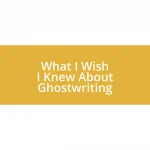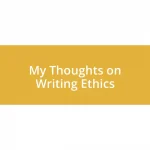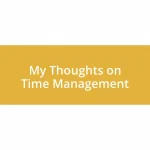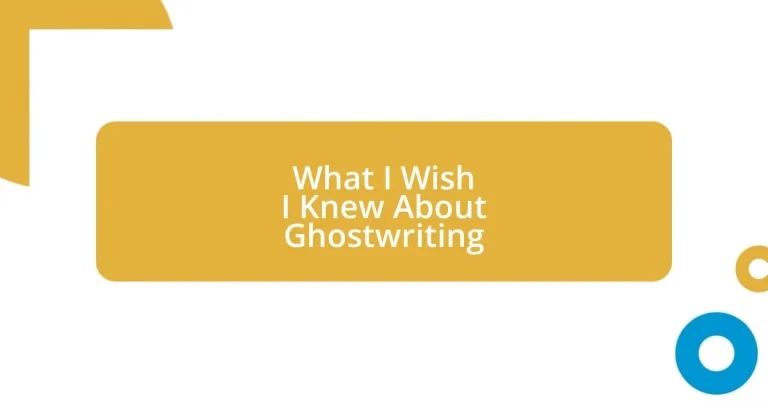Key takeaways:
- Ghostwriters play a crucial role in capturing clients’ voices and narratives, requiring empathy and a personal connection.
- Key skills for ghostwriters include adaptability, strong research capabilities, effective communication, and organizational skills.
- Establishing clear project expectations, including detailed outlines and flexibility, enhances the collaborative process.
- Navigating contracts carefully is essential to protect both parties, focusing on confidentiality, payment schedules, and rights ownership.
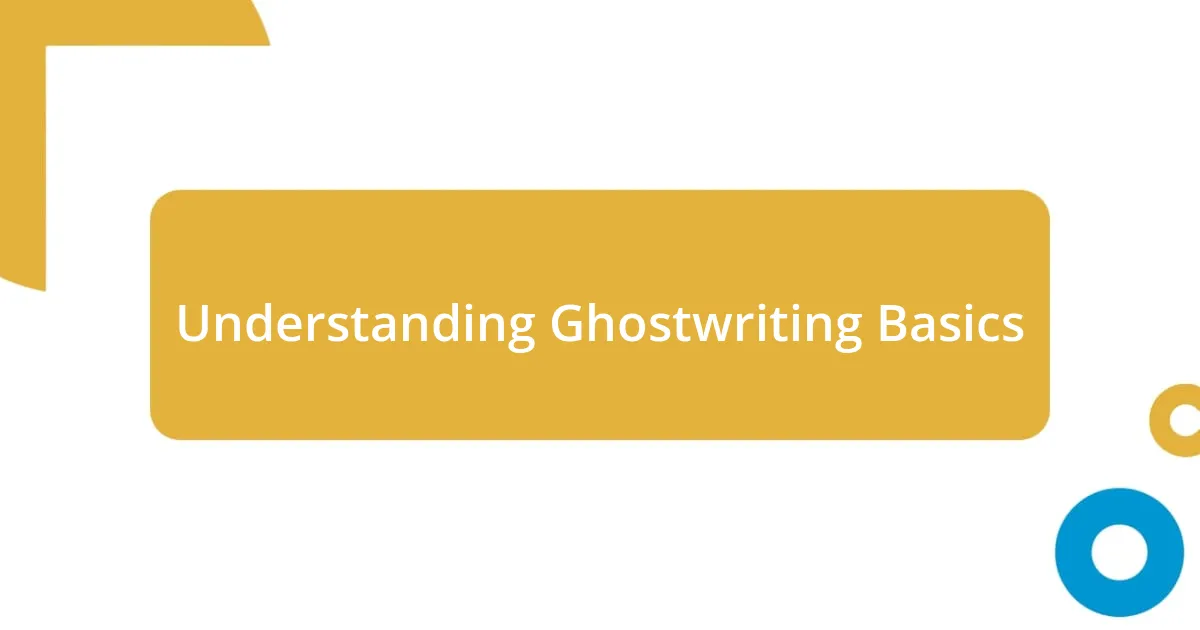
Understanding Ghostwriting Basics
Ghostwriting is an intriguing profession, often shrouded in mystery. As someone who’s dived into this world, I’ve found it fascinating how many people don’t realize that ghostwriters create content without taking credit. It’s like being a behind-the-scenes artist—your work sets the stage for someone else to shine.
When I first started ghostwriting, it surprised me how much trust is involved in this process. Clients often share their hopes, fears, and ideas, leaving their voice in my hands. Have you ever felt the weight of someone else’s story resting on your shoulders? It’s a unique experience, and it’s one that deepens my appreciation for the craft.
The relationship between a ghostwriter and their client can feel quite personal. It’s not just about words on a page; it’s about capturing a person’s essence. For instance, I once worked with a client whose journey of overcoming adversity deeply resonated with me. Understanding their struggles made my role crucial in conveying their narrative authentically. Finding that connection is what truly makes ghostwriting rewarding.
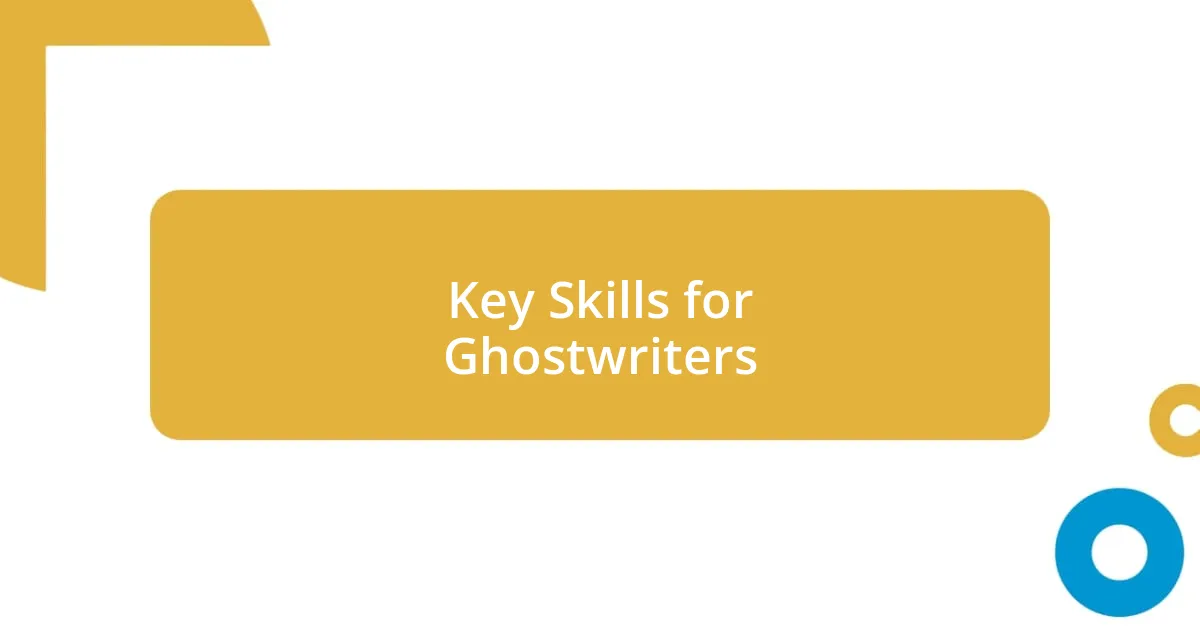
Key Skills for Ghostwriters
Key Skills for Ghostwriters
To truly thrive as a ghostwriter, there are essential skills that I’ve found to be game-changers in my experience. One of the most vital skills is adaptability. Every client has a unique voice and style, and it’s my job to seamlessly adopt that while infusing their personality into the narrative. I remember a project where I had to shift from a lighthearted tone to a more somber one halfway through. The challenge taught me the importance of being flexible and responsive to the changing needs of a client.
Additionally, strong research capabilities are non-negotiable. Ghostwriting often requires delving into topics that I may not be familiar with, so developing the skill to quickly gather information and understand different perspectives has been invaluable. Here are key skills that every ghostwriter should cultivate:
- Adaptability: Adjusting tone and style to match the client’s voice.
- Research Skills: Conducting thorough and effective research on diverse topics.
- Empathy: Understanding clients’ emotions and experiences to convey their stories authentically.
- Communication: Maintaining open and clear dialogue with clients to build trust and alignment.
- Organizational Skills: Managing multiple projects and deadlines efficiently.
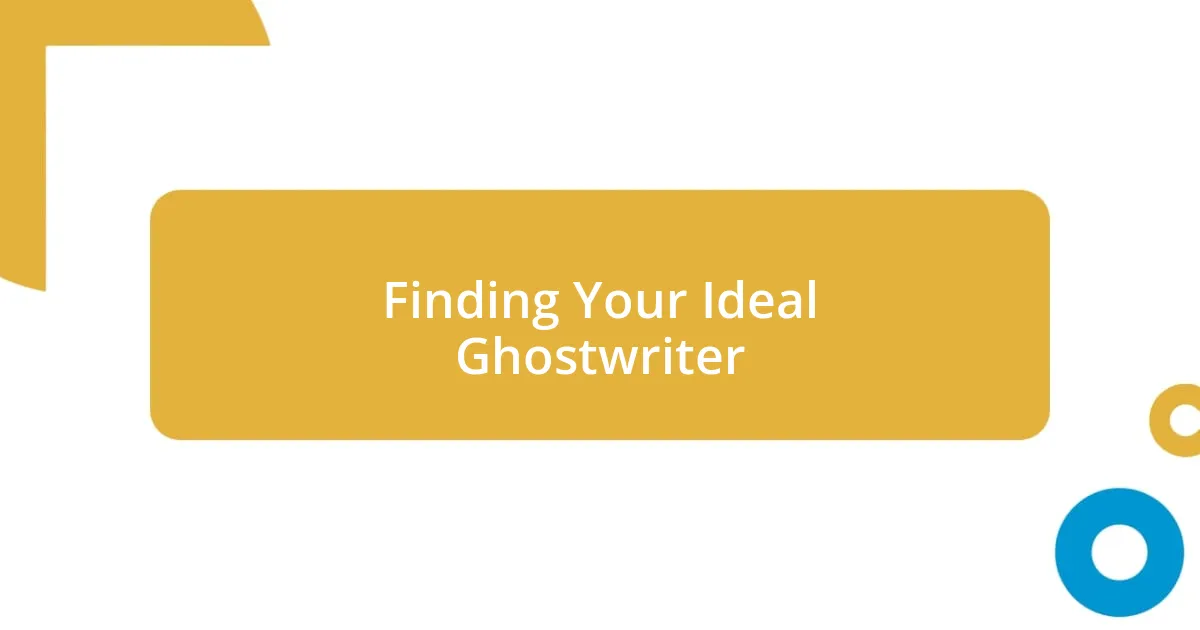
Finding Your Ideal Ghostwriter
Finding Your Ideal Ghostwriter requires a thoughtful approach. I believe that compatibility is key. When I started looking for my first ghostwriter, I realized that personal chemistry matters just as much as their writing skills. A good relationship fosters open communication, which is crucial when collaborating on a project that reflects your voice and vision. Trust me, if you don’t feel comfortable sharing your ideas, the final product might not resonate with you.
As I learned more about the process, I discovered that examining a ghostwriter’s portfolio can provide immense insights. I once overlooked this step and ended up working with someone whose style didn’t align with my expectations. A well-curated portfolio reveals not only their writing capabilities but also their adaptability and range. It’s essential to ensure that their past works reflect the type of writing you envision. Have you ever found a piece that just clicked? That’s the vibe you want!
Finally, don’t underestimate the importance of a clear contract. I made the mistake of relying solely on verbal agreements early on, which led to misunderstandings. A detailed contract outlining the scope, deadlines, and payment terms not only protects you but also establishes a professional relationship. It’s all about setting the right expectations from the get-go, which fosters confidence in your collaboration.
| Criteria | Considerations |
|---|---|
| Compatibility | Personal chemistry and communication style. |
| Portfolio Review | Assessing writing style and adaptability through past work. |
| Contractual Agreement | Clear terms to manage expectations and protect both parties. |
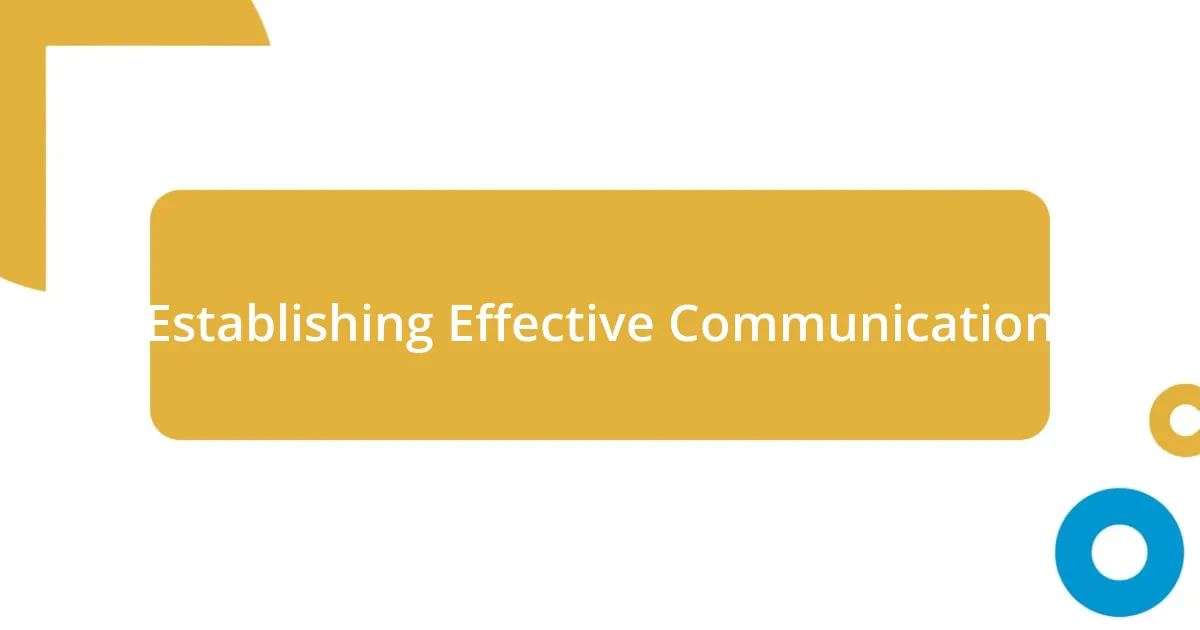
Establishing Effective Communication
Establishing effective communication with a client is vital in ghostwriting. I recall a time when a client and I had a misunderstanding about their project direction because I didn’t ask enough clarifying questions upfront. After realizing this, I made it a point to ask open-ended questions that encouraged them to express their thoughts fully. It’s amazing how just a few targeted questions can illuminate the path forward and create a stronger bond.
I believe you need to be proactive in communication to avoid potential pitfalls. I once sent weekly update emails to a client, which not only kept them informed but also made them feel involved in the process. Have you ever felt uncertain about how something is progressing? Consistent updates can eliminate that anxiety for both parties. It’s all about making your clients feel heard and valued.
Lastly, active listening plays a crucial role in creating an effective dialogue. I remember when a client shared not just their ideas but also their concerns about how the project might be received. By genuinely listening and acknowledging those fears, I was able to reassure them and adjust my approach accordingly. This practice of listening strengthens trust and ultimately enhances the final outcome. It’s a simple yet powerful tool that can transform your working relationship.
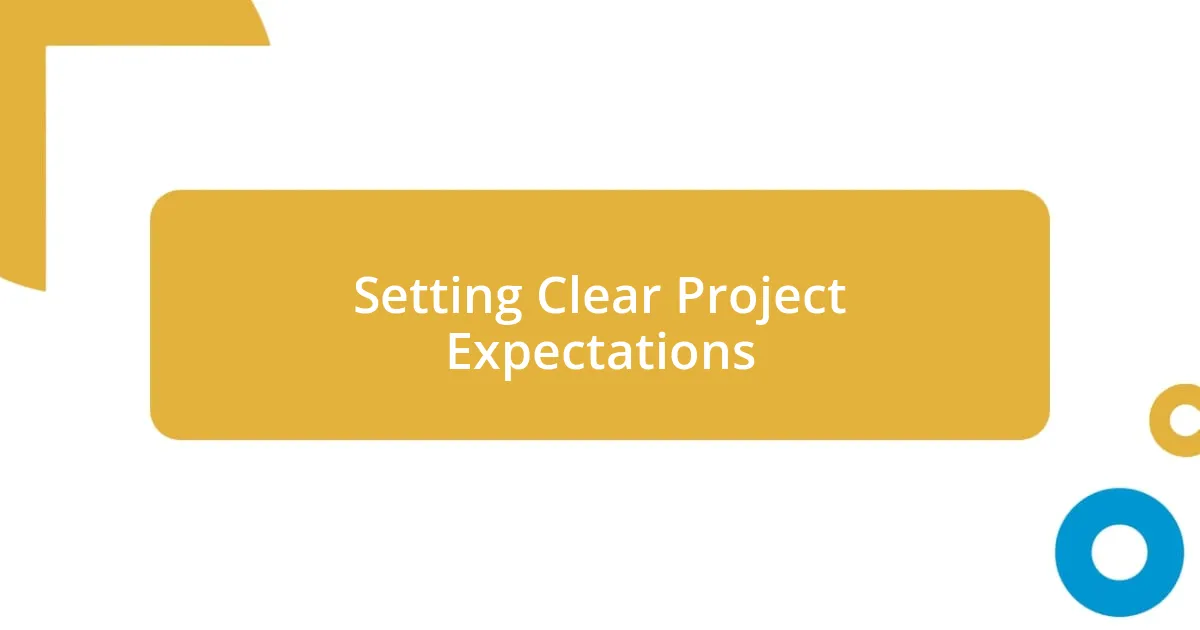
Setting Clear Project Expectations
Setting clear project expectations is one of the most critical steps in ghostwriting. I remember when I first embarked on a project without thorough discussions about deadlines and deliverables. It felt like running a race with no clear finish line! When both parties share a mutual understanding of what’s expected, it helps avoid those stressful surprises that can derail the creative process.
Having a detailed outline at the project’s outset can be a game changer. I distinctly recall a project where I collaborated with a client to create a comprehensive roadmap that outlined key milestones and content themes. This roadmap not only kept us on track but also gave us a sense of achievement with every milestone reached. It’s uplifting to look back and see tangible progress, isn’t it? Trust me, setting those benchmarks can motivate both you and your ghostwriter.
Lastly, I’ve learned that being open to adjustment is equally vital. Once, a client came to me halfway through a project with a desire to pivot the focus of their narrative. While this change initially felt daunting, embracing it allowed us to craft a richer and more relevant story. Are you willing to adapt? Flexibility can lead to incredible creative breakthroughs and ultimately enhance the quality of the work.
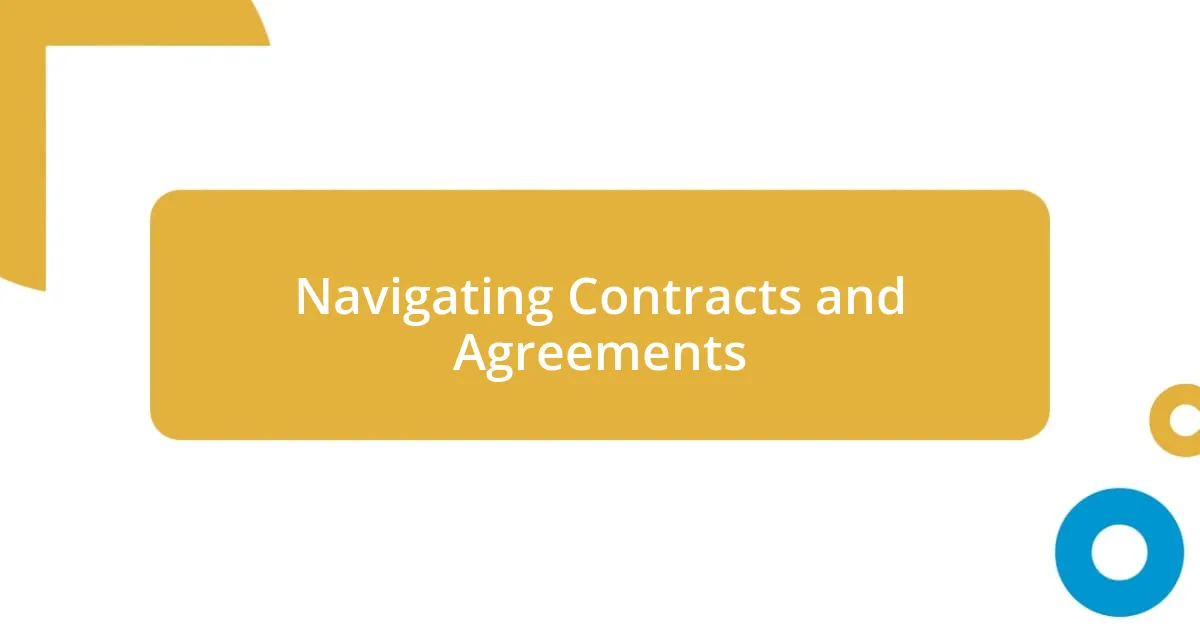
Navigating Contracts and Agreements
Navigating contracts and agreements in ghostwriting can feel daunting, but I’ve learned that a solid contract serves as a protective shield for both parties. I remember the first contract I signed—it felt overwhelming with its legal jargon. But breaking it down bit by bit helped me understand each section’s importance, especially the clauses related to payment and rights. Have you ever found yourself bogged down by formal language? Trust me, asking for clarification when something doesn’t make sense is crucial.
One key aspect I always emphasize in agreements is confidentiality. There was a time when I worked on a high-profile project where discretion was paramount. The confidentiality clause not only protected my client’s privacy but also gave me peace of mind. I now make it a point to discuss how and when client information remains confidential. How important do you think trust is in our line of work? I believe it’s everything.
Lastly, I encourage you to pay attention to the details of payment schedules and rights regarding ownership of the work. I learned this the hard way when I produced a piece that a client decided to never use, but the rights were still mine. This situation taught me the value of explicitly defining ownership and termination clauses in the contract. Ask yourself, can you afford to lose your rights over something you’ve invested so much time and energy into? Knowing how to navigate these agreements empowers you to protect your work and offers clarity for future projects.
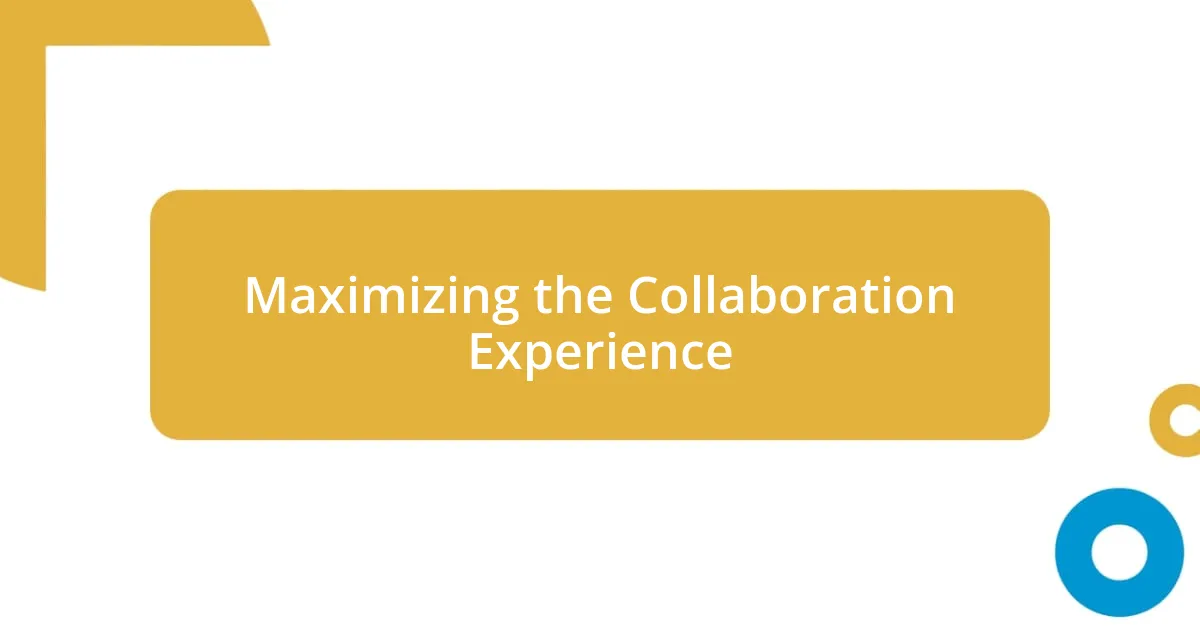
Maximizing the Collaboration Experience
One of the best ways to maximize the collaboration experience is to foster an open line of communication throughout the project. I’ve had instances where regular check-ins transformed a good project into a spectacular one. During a recent collaboration, we scheduled quick weekly calls that evolved into brainstorming sessions where new ideas blossomed. Have you ever noticed how much creativity flows when you just chat? Those casual conversations can be fertile ground for innovation, making the entire process more enjoyable.
Additionally, embracing constructive feedback is essential. There was a pivotal moment in my career when I received a critique that challenged my original viewpoint. Initially, it stung a little, but upon reflection, I realized it pushed my work to a new level. I encourage you to view feedback as a tool for growth. How often do we let pride get in the way of progress? Shifting your mindset can lead to richer narratives and a stronger final product.
Lastly, I find that celebrating small victories can enhance the collaboration experience tremendously. Reflecting back, I recall a project milestone where we shared a simple toast over coffee on completing a chapter. The camaraderie it created was palpable, and it reinforced our bond as collaborators. Have you taken the time to acknowledge achievements in your projects? I believe that these moments of celebration foster a positive atmosphere, driving not only productivity but also a deeper sense of partnership.

